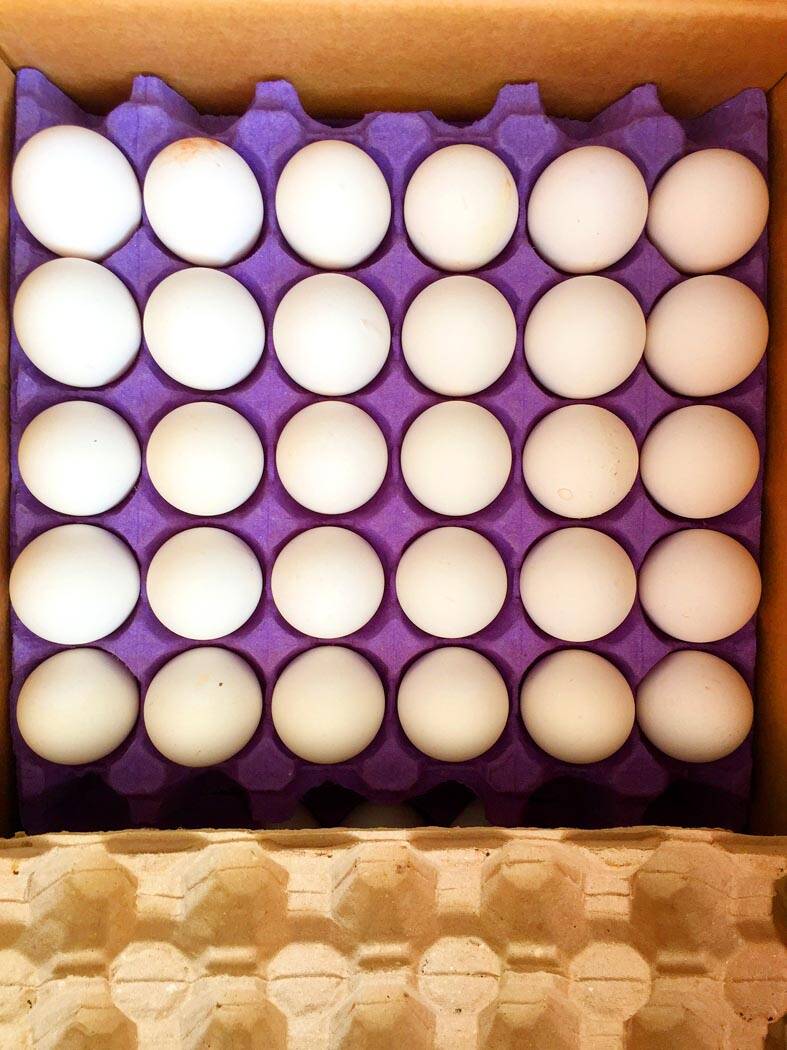A government program to import eggs from nine nations, introduced earlier this year in an effort to address a domestic supply shortage, has identified substandard supply from Turkey totaling 127.62 tonnes, the Food and Drug Administration (FDA) said yesterday.
In its weekly release on substandard food products intercepted at the border, the FDA said it seized the eggs in five batches from Wednesday last week to yesterday after finding them to contain cancer-causing nitrofurans, which are banned in Taiwan.
The problematic eggs have been destroyed or returned to Turkey, the FDA said.

Photo: Wu Liang-yi, Taipei Times
Taiwan has had a shortage of eggs since the Lunar New Year, which the Council of Agriculture has blamed on several factors, including unpredictable weather, increased feed costs, a high number of molting hens and large-scale culling due to avian influenza outbreaks.
To make up for the shortfall, the government has sought to ramp up egg imports from nations such as Turkey, the US and Australia, while also importing more breeder chickens to help local farms increase production.
The substandard eggs are among a total of 397 shipments imported from the nine nations as of Sunday, FDA Deputy Director Lin Chin-fu (林金富) said.
However, as the eggs were imported under the government program, the FDA would not impose penalties on the importer, the National Animal Industry Foundation, Lin said.
Domestic daily demand is about 24 million eggs, the council said in late March, and it has reduced monthly imports from about 30 million to 10 million this month as domestic supply has increased to 22.8 million eggs per day.
In the event there is a surplus of imported eggs, they are to be preserved in liquid form and used as a backup, the council said.

The Central Election Commission has amended election and recall regulations to require elected office candidates to provide proof that they have no Chinese citizenship, a Cabinet report said. The commission on Oct. 29 last year revised the Measures for the Permission of Family-based Residence, Long-term Residence and Settlement of People from the Mainland Area in the Taiwan Area (大陸地區人民在台灣地區依親居留長期居留或定居許可辦法), the Executive Yuan said in a report it submitted to the legislature for review. The revision requires Chinese citizens applying for permanent residency to submit notarial documents showing that they have lost their Chinese household record and have renounced — or have never

A magnitude 5.6 earthquake struck off the coast of Yilan County at 12:37pm today, with clear shaking felt across much of northern Taiwan. There were no immediate reports of damage. The epicenter of the quake was 16.9km east-southeast of Yilan County Hall offshore at a depth of 66.8km, Central Weather Administration (CWA) data showed. The maximum intensity registered at a 4 in Yilan County’s Nanao Township (南澳) on Taiwan’s seven-tier scale. Other parts of Yilan, as well as certain areas of Hualien County, Taipei, New Taipei City, Taoyuan, Hsinchu County, Taichung and Miaoli County, recorded intensities of 3. Residents of Yilan County and Taipei received

Taiwan has secured another breakthrough in fruit exports, with jujubes, dragon fruit and lychees approved for shipment to the EU, the Ministry of Agriculture said yesterday. The Animal and Plant Health Inspection Agency on Thursday received formal notification of the approval from the EU, the ministry said, adding that the decision was expected to expand Taiwanese fruit producers’ access to high-end European markets. Taiwan exported 126 tonnes of lychees last year, valued at US$1.48 million, with Japan accounting for 102 tonnes. Other export destinations included New Zealand, Hong Kong, the US and Australia, ministry data showed. Jujube exports totaled 103 tonnes, valued at

BIG SPENDERS: Foreign investors bought the most Taiwan equities since 2005, signaling confidence that an AI boom would continue to benefit chipmakers Taiwan Semiconductor Manufacturing Co’s (TSMC, 台積電) market capitalization swelled to US$2 trillion for the first time following a 4.25 percent rally in its American depositary receipts (ADR) overnight, putting the world’s biggest contract chipmaker sixth on the list of the world’s biggest companies by market capitalization, just behind Amazon.com Inc. The site CompaniesMarketcap.com ranked TSMC ahead of Saudi Aramco and Meta Platforms Inc. The Taiwanese company’s ADRs on Tuesday surged to US$385.75 on the New York Stock Exchange, as strong demand for artificial intelligence (AI) applications led to chip supply constraints and boost revenue growth to record-breaking levels. Each TSMC ADR represents